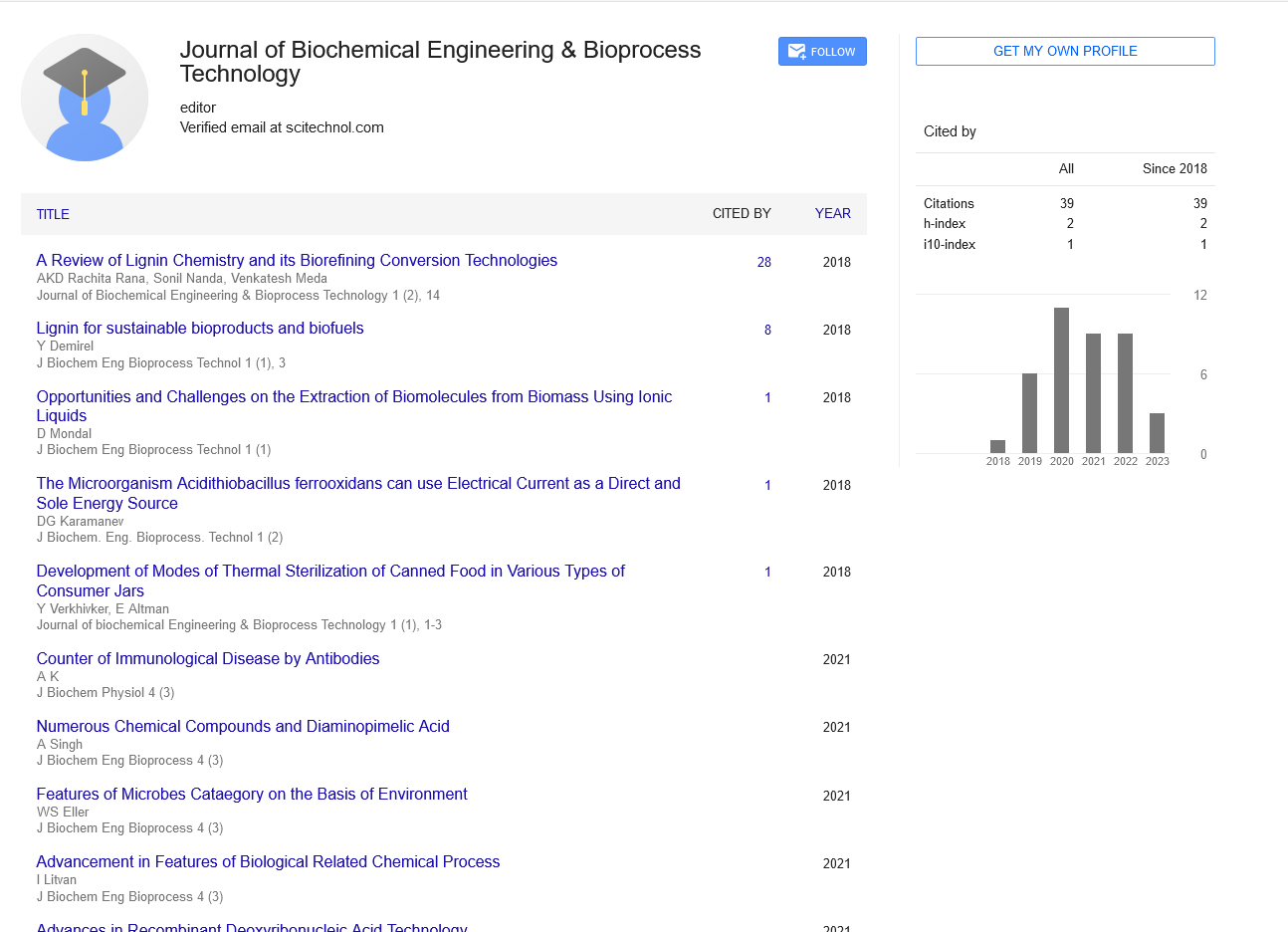Perspective, J Biochem Eng Bioprocess Vol: 6 Issue: -1
Advances in Metabolic Engineering: Unlocking Biochemical Pathways for Sustainable Bioprocessing
Kieran Ronan*
1Department of Biochemical Engineering & Bioprocess Technology, Massachusetts Institute of Technology, Cambridge, United States of America
*Corresponding Author: Kieran Ronan,
Department of Biochemical Engineering
& Bioprocess Technology, Massachusetts Institute of Technology, Cambridge,
United States of America
E-mail: ronank@massa.edu
Received date: 22 May, 2023, Manuscript No. JBEBT-23-106918;
Editor assigned date: 24 May, 2023, Pre QC. JBEBT-23-106918 (PQ);
Reviewed date: 15 June, 2023, QC No. JBEBT-23-106918;
Revised date: 22 June, 2023, Manuscript No. JBEBT-23-106918 (R);
Published date: 29 June, 2023, DOI: 10.35248/jbebt.1000057.
Citation: Ronan K (2023) Advances in Metabolic Engineering: Unlocking Biochemical Pathways for Sustainable Bioprocessing. J Biochem Eng Bioprocess 7:2.
Keywords: Bioprocess
Description
Metabolic engineering is a powerful discipline that enables the modification and optimization of biochemical pathways in microorganisms for sustainable bioprocessing. This study aims to provide an overview of recent advances in metabolic engineering and its potential for unlocking novel pathways, enhancing product yields, and improving the sustainability of bioprocesses. The study explores key strategies employed in metabolic engineering, such as pathway engineering, genome editing, and synthetic biology, along with their applications in diverse fields. Furthermore, it discusses the challenges and future prospects of metabolic engineering in driving sustainable bio-based industries.
Pathway engineering: Redesigning biochemical pathways
Pathway engineering focuses on the modification and optimization of specific biochemical pathways within microorganisms. This section discusses various strategies employed in pathway engineering, including gene overexpression, knockout, and optimization of enzymatic reactions. It also explores the use of advanced tools such as dynamic control systems and flux balance analysis for pathway optimization. Additionally, it highlights successful case studies where pathway engineering has led to the development of novel and efficient pathways for bioprocessing.
Genome editing: Precise manipulation of microbial genomes
Genome editing technologies, such as CRISPR-Cas9, have revolutionized metabolic engineering by providing precise and efficient tools for genetic manipulation. This section discusses the applications of genome editing in metabolic engineering, including gene knockouts, gene insertions, and regulatory element engineering. It also explores the use of multiplex genome editing for simultaneous modifications of multiple genes, enabling the fine-tuning of metabolic pathways. The section further highlights the potential of genome-scale engineering for the optimization of complex metabolic networks.
Synthetic biology : Designing customied microbial
Synthetic biology combines principles from engineering and biology to design and construct novel genetic circuits and pathways. This section discusses the role of synthetic biology in metabolic engineering, including the design of biosensors, genetic switches, and regulatory elements to control and optimize metabolic pathways. It also explores the use of standardized genetic parts and libraries for efficient pathway construction and fine-tuning. The section further emphasizes the potential of synthetic biology in developing customized microbial platforms for sustainable bioprocessing.
Applications in diverse fields
Metabolic engineering finds applications in diverse fields, including biofuel production, pharmaceutical manufacturing, and bioplastics synthesis. This section provides examples of successful applications in these areas, highlighting how metabolic engineering has enabled the production of renewable biofuels with improved yields and properties, the synthesis of high-value pharmaceutical compounds using microbial hosts, and the development of environmentally friendly bioplastics. It also discusses the potential of metabolic engineering in addressing global challenges such as sustainable agriculture, waste valorization, and carbon capture.
Challenges and future perspectives
While metabolic engineering has shown tremendous potential, several challenges need to be addressed. This section discusses the limitations of current methodologies, including the complexity of cellular metabolism and the need for efficient screening and optimization strategies. It also emphasizes the importance of considering ecological and sustainability aspects in metabolic engineering approaches. Furthermore, the section highlights emerging areas of research, such as systems biology and machine learning, which hold potential for addressing these challenges and unlocking new opportunities in sustainable bioprocessing.
Conclusion
Advances in metabolic engineering have opened up new avenues for unlocking novel biochemical pathways and optimizing microbial hosts for sustainable bioprocessing. This study provides an overview of key strategies employed in metabolic engineering, including pathway engineering, genome editing, and synthetic biology. Successful applications in various fields highlight the potential of metabolic engineering in driving sustainable bio-based industries. Despite challenges, continued research in these field abilities to unlock new pathways, improve product yields, and contribute to the development of a bioeconomy that is environmentally friendly and economically viable.
 Spanish
Spanish  Chinese
Chinese  Russian
Russian  German
German  French
French  Japanese
Japanese  Portuguese
Portuguese  Hindi
Hindi 